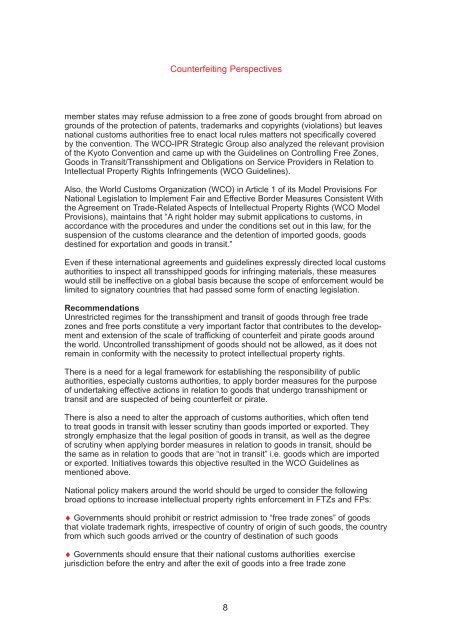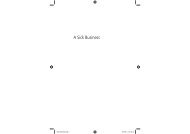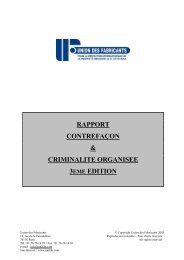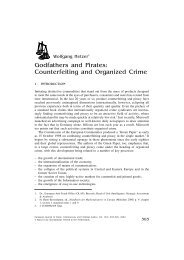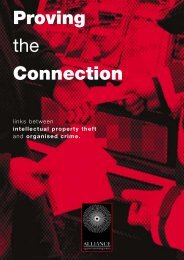counterforce - Counterfeiting
counterforce - Counterfeiting
counterforce - Counterfeiting
Create successful ePaper yourself
Turn your PDF publications into a flip-book with our unique Google optimized e-Paper software.
<strong>Counterfeiting</strong> Perspectives<br />
member states may refuse admission to a free zone of goods brought from abroad on<br />
grounds of the protection of patents, trademarks and copyrights (violations) but leaves<br />
national customs authorities free to enact local rules matters not specifically covered<br />
by the convention. The WCO-IPR Strategic Group also analyzed the relevant provision<br />
of the Kyoto Convention and came up with the Guidelines on Controlling Free Zones,<br />
Goods in Transit/Transshipment and Obligations on Service Providers in Relation to<br />
Intellectual Property Rights Infringements (WCO Guidelines).<br />
Also, the World Customs Organization (WCO) in Article 1 of its Model Provisions For<br />
National Legislation to Implement Fair and Effective Border Measures Consistent With<br />
the Agreement on Trade-Related Aspects of Intellectual Property Rights (WCO Model<br />
Provisions), maintains that “A right holder may submit applications to customs, in<br />
accordance with the procedures and under the conditions set out in this law, for the<br />
suspension of the customs clearance and the detention of imported goods, goods<br />
destined for exportation and goods in transit.”<br />
Even if these international agreements and guidelines expressly directed local customs<br />
authorities to inspect all transshipped goods for infringing materials, these measures<br />
would still be ineffective on a global basis because the scope of enforcement would be<br />
limited to signatory countries that had passed some form of enacting legislation.<br />
Recommendations<br />
Unrestricted regimes for the transshipment and transit of goods through free trade<br />
zones and free ports constitute a very important factor that contributes to the development<br />
and extension of the scale of trafficking of counterfeit and pirate goods around<br />
the world. Uncontrolled transshipment of goods should not be allowed, as it does not<br />
remain in conformity with the necessity to protect intellectual property rights.<br />
There is a need for a legal framework for establishing the responsibility of public<br />
authorities, especially customs authorities, to apply border measures for the purpose<br />
of undertaking effective actions in relation to goods that undergo transshipment or<br />
transit and are suspected of being counterfeit or pirate.<br />
There is also a need to alter the approach of customs authorities, which often tend<br />
to treat goods in transit with lesser scrutiny than goods imported or exported. They<br />
strongly emphasize that the legal position of goods in transit, as well as the degree<br />
of scrutiny when applying border measures in relation to goods in transit, should be<br />
the same as in relation to goods that are “not in transit” i.e. goods which are imported<br />
or exported. Initiatives towards this objective resulted in the WCO Guidelines as<br />
mentioned above.<br />
National policy makers around the world should be urged to consider the following<br />
broad options to increase intellectual property rights enforcement in FTZs and FPs:<br />
♦ Governments should prohibit or restrict admission to “free trade zones” of goods<br />
that violate trademark rights, irrespective of country of origin of such goods, the country<br />
from which such goods arrived or the country of destination of such goods<br />
♦ Governments should ensure that their national customs authorities exercise<br />
jurisdiction before the entry and after the exit of goods into a free trade zone<br />
8


